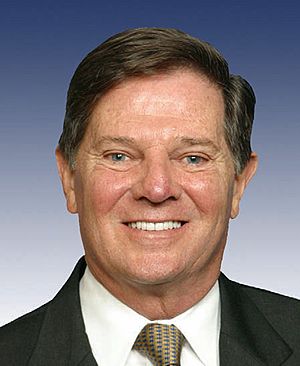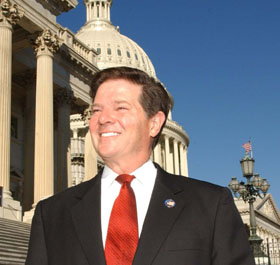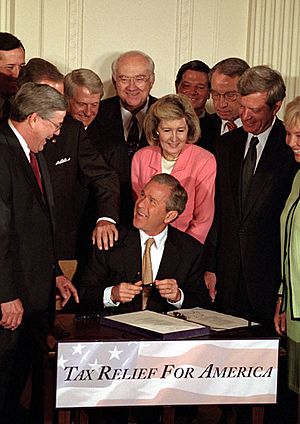Tom DeLay facts for kids
Quick facts for kids
Tom DeLay
|
|
|---|---|
 |
|
| House Majority Leader | |
| In office January 3, 2003 – September 28, 2005 |
|
| Speaker | Dennis Hastert |
| Preceded by | Dick Armey |
| Succeeded by | Roy Blunt (acting) |
| House Majority Whip | |
| In office January 3, 1995 – January 3, 2003 |
|
| Speaker | Newt Gingrich (1995–1999) Dennis Hastert (1999–2003) |
| Preceded by | David Bonior |
| Succeeded by | Roy Blunt |
| Secretary of the House Republican Conference | |
| In office January 3, 1993 – January 3, 1995 |
|
| Leader | Bob Michel |
| Preceded by | Vin Weber |
| Succeeded by | Barbara Vucanovich |
| Member of the U.S. House of Representatives from Texas's 22nd district |
|
| In office January 3, 1985 – June 9, 2006 |
|
| Preceded by | Ron Paul |
| Succeeded by | Shelley Sekula-Gibbs |
| Member of the Texas House of Representatives |
|
| In office January 9, 1979 – January 8, 1985 |
|
| Preceded by | Joe A. Hubenak |
| Succeeded by | Jim Tallas |
| Constituency | 21st district (1979–1983) 26th district (1983–1985) |
| Personal details | |
| Born |
Thomas Dale DeLay
April 8, 1947 Laredo, Texas, U.S. |
| Political party | Republican |
| Spouse | Christine Furrh |
| Children | 1 |
| Residences | Sugar Land, Texas, U.S. |
| Education | University of Houston (BS) |
| Profession | Politician |
Thomas Dale DeLay (born April 8, 1947) is a retired American politician and author. As a member of the Republican Party, he represented Texas's 22nd congressional district in the United States House of Representatives from 1985 to 2006. He became one of the most powerful leaders in Congress, serving as the House Majority Leader from 2003 to 2005.
DeLay started his political journey in 1978 in the Texas House of Representatives. In 1984, he was elected to the U.S. Congress. He quickly rose through the ranks, becoming a deputy minority whip in 1988. In 1994, he was a key figure in the "Republican Revolution," which helped Republicans win control of Congress for the first time in 40 years.
In 2005, DeLay faced legal challenges related to campaign fundraising in Texas. He stepped down from his leadership role and later resigned from Congress in 2006. After a long legal process, all charges against him were eventually dismissed by the courts.
After leaving politics, DeLay wrote a book about his experiences and founded a consulting firm. He also became known for his work supporting foster care.
Contents
Early Life and Education
Thomas Dale DeLay was born in Laredo, Texas. He was one of three sons of Maxine and Charles Ray DeLay. Because his father worked in the oil and gas industry, he spent much of his childhood in Venezuela.
He went to high school in Corpus Christi, Texas, where he played football and was a lead dancer in school shows. He attended Baylor University for two years before transferring. DeLay graduated from the University of Houston in 1970 with a degree in biology.
After college, DeLay worked for a pesticide company and later started his own pest control business, which became very successful. His experience as a business owner shaped his political views, especially his belief that the government should not create too many rules for businesses.
Political Career
Texas and Early U.S. Congress Career
In 1978, DeLay was elected to the Texas House of Representatives, becoming the first Republican to represent his county. He served there until 1984, when he ran for the U.S. Congress and won. He was reelected 10 times in his solidly Republican district.
In Washington, D.C., DeLay became known for his conservative views. He was appointed to the powerful House Appropriations Committee, which decides how the government spends money. He also became a leader among conservative Republicans.
House Majority Whip
After the "Republican Revolution" in 1994, DeLay was elected House Majority Whip. The whip's job is to make sure members of their party vote together on important bills. DeLay was very good at this job and earned the nickname "The Hammer" for his ability to enforce party discipline. He liked the nickname, saying a hammer is a useful tool for a carpenter.
DeLay played a key role in many major political events of the 1990s. He was a strong supporter of the effort to impeach President Bill Clinton in 1998. After Newt Gingrich stepped down as Speaker of the House, DeLay helped his colleague Dennis Hastert get elected to the position.
House Majority Leader

In 2003, DeLay was elected House Majority Leader, the second-most powerful position in the House of Representatives. He was known for his skill in passing legislation, often by very close votes. He worked to keep his party unified and was very effective at getting Republican-backed bills passed.
DeLay also helped create the K Street Project, an effort to encourage lobbying firms in Washington, D.C., to hire Republicans. Lobbyists are people who try to influence politicians on behalf of different groups or industries.
In 2005, DeLay stepped down as majority leader after he was indicted on charges related to campaign finance in Texas. He later announced he would not try to get the position back and resigned from Congress in 2006.
Legal and Ethical Questions
Throughout his career, DeLay faced several ethical questions and legal challenges.
Campaign Finance Investigation
In 2005, DeLay was charged in Texas with breaking campaign finance laws. The case was about how money was raised and used to help Republican candidates in the 2002 Texas state elections. After a trial in 2010, he was found guilty.
However, DeLay appealed the decision. In 2013, a Texas appeals court overturned the conviction, stating there was not enough evidence to support the charges. The court's decision to acquit him was upheld by Texas's highest criminal court in 2014, officially clearing him of all charges.
Working with Lobbyists
DeLay's close relationship with lobbyists, especially Jack Abramoff, led to investigations. A lobbyist's job is to persuade politicians, and there are strict rules about what gifts or trips politicians can accept from them.
Investigations looked into trips DeLay took that were paid for by groups connected to Abramoff. For example, a golfing trip to Scotland was paid for by a nonprofit organization that had received large donations from Abramoff's clients. House rules do not allow members to accept travel from lobbyists. DeLay said he did not know lobbyists had paid for the trip. These events raised questions about the influence of money in politics.
Political Views
DeLay was known as a strong conservative. He supported lower taxes, fewer government regulations on businesses, and gun rights. He was a critic of the Environmental Protection Agency (EPA).
He was also a strong supporter of the state of Israel. During a trip there in 2003, he spoke to the Israeli parliament, the Knesset, and expressed his firm support for the country.
In 2005, DeLay was a key figure in the federal government's intervention in the Terri Schiavo case. Schiavo was a woman in Florida who was in a persistent vegetative state. Her husband and parents disagreed about whether to remove her feeding tube. DeLay and other members of Congress passed a special law to have a federal court review the case.
Life After Congress
After leaving Congress, DeLay co-wrote a book about his political career called No Retreat, No Surrender: One American's Fight. He also started a blog and became active on social media.
DeLay has been a strong advocate for foster care reform. He and his wife, Christine, helped found a community in Richmond, Texas, that provides homes for children who have been abused or neglected.
In 2009, DeLay appeared as a contestant on the TV show Dancing with the Stars. He was paired with professional dancer Cheryl Burke. He had to withdraw from the competition due to an injury.
Personal Life
DeLay married Christine Furrh in 1967. They have one daughter, Danielle. In 1985, DeLay became a born-again Christian, which he said was a major turning point in his life.
See also
 In Spanish: Tom DeLay para niños
In Spanish: Tom DeLay para niños
- List of federal political scandals in the United States
 | Leon Lynch |
 | Milton P. Webster |
 | Ferdinand Smith |


